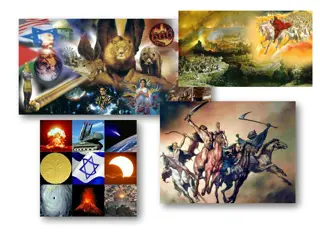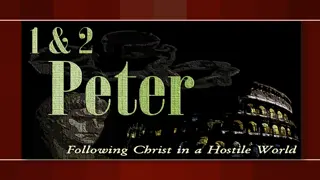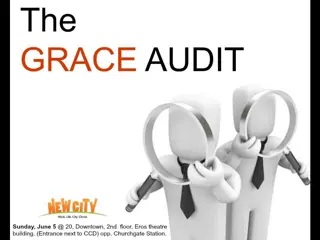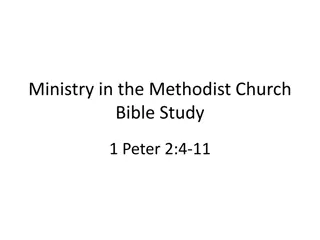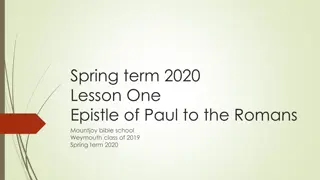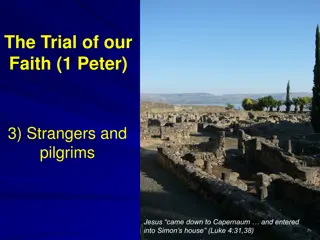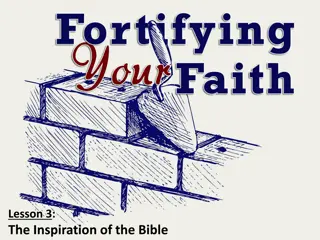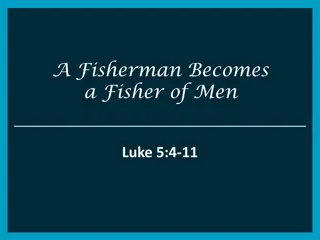Insights from 1 Peter Chapter 2 Bible Study
Delve into the profound teachings of 1 Peter Chapter 2, exploring the themes of spiritual growth, obedience, and motivation for godly living. Discover the importance of laying aside certain behaviors to allow room for spiritual growth and the necessity of obedience in salvation. Gain insight into living a life that reflects love, faithfulness, and obedience to God's Word.
Download Presentation

Please find below an Image/Link to download the presentation.
The content on the website is provided AS IS for your information and personal use only. It may not be sold, licensed, or shared on other websites without obtaining consent from the author.If you encounter any issues during the download, it is possible that the publisher has removed the file from their server.
You are allowed to download the files provided on this website for personal or commercial use, subject to the condition that they are used lawfully. All files are the property of their respective owners.
The content on the website is provided AS IS for your information and personal use only. It may not be sold, licensed, or shared on other websites without obtaining consent from the author.
E N D
Presentation Transcript
FULLVIEW WEDNESDAY NIGHT BIBLE STUDY 1 PETER CHAPTER TWO www.bing.com/images/
1 Peter Chapter two covers the topics of growing, being and doing. All of which flows from the conclusion of 1 Peter Chapter 1. The first three verses of chapter 2 teaches that we will grow by laying aside certain things and desiring other things in their place. Once these things are removed, then there is a spiritual growth that can take place because of the pure Word of God having control in our lives.
Motivation for Godly Living (1 Peter 1:18-21) We must be aware that we are always in the presence of God and remember that we will be judged according to our work: what we do, not just what we believe. (Mat 25:31-46; 2 Cor 5:10) We must live our lives in the shadow of eternity knowing that we are going to be with God. (Jo 14:3) The proper way to show fear for God is to live in obedience and faithfulness to Him, so that we need not have terror of punishment. (Psa 111:10)
Obedience Necessary to Salvation (1 Peter 1:22-25) We must have faith enough to obey God s word. Surely faith is essential, but the actual purification does not occur until we do what God has commanded. (Rom 6:17-18; Heb 5:9) If we have passed from death to life, then we must be determined to show it by our love. (Jo 13:34-35) We must be determined to make love happen as a matter of choice by faith in the power of God. (Jo 15:12; 1 Jo 4:11) The word was sent here to remain and always be present to produce this new birth in the lives of receptive men.
What is the wherefore there for? Wherefore (therefore) Knowing that Christ gave the ultimate sacrifice (His own life) to redeem us from sin, this should motivate us in turn to love the people around us. Knowing that God s Word endures whereas the physical materials around us are temporary, also motivates us to love others.
Strip off the Old Things (1 Peter 2:1) Things that defile the believer and need to be put off: (Rom 1:29-32) Guile- means to deceive and mislead people: is deceitfulness, especially lying and false speech; thus it is usually spoken of as being on the lips, or found in the mouth. (Col 3:8) Hypocrisies- is pretending to be what one knows he is not. A person is a hypocrite when they pretend to be following God, but are living like they want to live. (Mat 23:15-33) Envies- means to covet what someone else has: it springs from jealousies that are displeased with all beauty, achievement, virtue, or any other desirable quality in others. (Prov 23L17; Gal 5:26) All evil speakings- means to criticize, judge, backbite, gossip, condemn, and grumble against. Christians are not to judge and speak evil of each other. (2 Cor 12:20; Jas 4:11)
Long for the Spiritual Milk (1 Peter 2:2-3) Once those things are removed, then there is a spiritual growth that can take place because of the pure Word of God having control in our lives. The believer is to crave one thing- the milk of God s word. Growth can come only as we live in the Word day by day. The word milk usually refers to the food needed by immature believers. But here all believers are seen as needing to grow and to learn more about Christ.
Maturity-Growth-Spiritual (1 Peter 2:2-3) The result of craving the Word of God is that God feeds our souls, teaching us about His grace. He teaches us: How to live clean and pure lives How to conquer the temptations and walk through the trials of life About salvation and promises He has made About Himself and Christ and the glorious hope we have in Him About how to worship, praise and honor Him (Preacher s Outline and Sermon Bible)
Christ the Living Stone (1 Peter 2:4-8) A living stone is a metaphor for Christ who is the Lord of life. It is how God looks at Christ and His followers. They are like a building that is being built by God Himself The foundation of the building is Christ (Mat 16:18) the corner stone is the supportive stone (1 Cor 3:11) The Stone was chosen by God but rejected by men
Believers are Living Stones (1 Peter 2:5-6) When believers place their lives upon the living Stone they become living stones that shall exist forever. (Jo 5:24-25) A spiritual House: includes all believers of all generations A holy priesthood: the function of the priest is to stand between God and man, to represent men before God and to present men to God. We have access to God and our task it is to bring others to Him. The priest brings an offering to God. Christians are spiritual sacrifices and our works are an offering to God. What God desires most of all is the love of our hearts and the service of our lives.(Rom 12:1-2)
The State of the Unbelievers (1 Peter 2:7-8) Believers, and their salvation in Christ, are a fulfilment of prophecy. (Ps 118:22; Isa 28:16; Jo 1:12; Rom 1:16) Unbelievers are the lost and unsaved: they are pictured as disobedient builders, disqualifying the Stone and which stumble at the Word. Despite the rejection of men Christ is made the chief cornerstone of the only permanent and lasting building- the church.
The Glory of The Church (1 Peter 2:9-10) Know who you are: We are not a people who stumble over Christ. To stumble means that we have tripped up and fallen, that we damage ourselves. We have entrusted our whole being into the keeping of Christ. We have become a chosen generation: The idea is that of a new race of people. This means that the Christian is called out of insignificance into significance. (Hos 1:9-10) We have become a royal priesthood: simply means we are priest od royalty who belong to the King of kings and Lord of lords. (Acts 17:28)
The Glory of The Church (1 Peter 2:9-10) We have become a holy nation: Holy means separated, set apart, different. God is drawing people from all over the world, from all nations of the world and creating anew nation that is dedicated to God's will and to God's service. (Ex 19:6; Isa 35:8) We have become a peculiar people: We are a purchased people. We belong to God and the value of a thing lies in the fact that some one has possessed it. Possession also has the idea of provision, protection, and security. (Psa 100:3; Rev 21:3) (William Barclay s Commentary-Preacher s Outline and Sermon Bible)
The Believers Purpose (1 Peter 2:9-10) The Christian is chosen for three things: The Christian is chosen for privilege. In Jesus Christ there is offered to us a new and intimate fellowship with God. The Christian is chosen for obedience. Privilege brings with it responsibility. The Christian is chosen in order that we may become the obedient children of God. The Christian is chosen for service and is the servant of God. (William Barclay s Commentary)
The Believers Purpose (1 Peter 2:9-10) The very task of the Christian is to witness for God, to share the glorious message of God. (Mk 16:15) The message we are to share is that God will deliver man out of darkness into His marvelous light. (Psa 66:16) We are to proclaim the truth that God has saved us through the Light of the world, Jesus Christ. (Jo 1:5-9)
The Believers Purpose (1 Peter 2:9-10) Not a people: means to be without purpose and significance in life, to be missing the very point of life. Not received mercy: The Christian is called out of no mercy, into mercy. God had mercy on us and adopted us as His children. (Rom 8:15; Eph 2:4-9) The Christian may be a very ordinary person but we acquired a new value because he belongs to God. (Jo 1L12; Gal 4:4-6)
Reasons for Right Living (1 Peter 2:11-12) The basic commandment in these verses is that the Christian should abstain from fleshly desires. In the N.T., flesh stands for far more than the physical nature of man. It stands for human nature apart from God; it means unredeemed human nature; it means life lived without the standards, the help, the grace and the influence of Christ. Fleshly desires and sins of the flesh, therefore, include not only the grosser sins but all that is characteristic of fallen human nature. (William Barclay s Commentary-Preacher s Outline and Sermon Bible)
Reasons for Right Living (1 Peter 2:11-12) There are two reasons to abstain from fleshly desires: We are not permanent residents here. The Christian must abstain from these sins because he is a stranger and a pilgrim on earth, someone who is only temporarily resident in a place and whose home is somewhere else. (Jo 14:1-3; Heb 11:9-13) We are God s witnesses here. The world watches everything a Christian does and we must live honest lives before the world. Whether we like it or not, every Christian is an advertisement for Christianity; by his life he either commends it to others or makes them think less of it. (Mat 5:16; Tit 2:7, Jas 2:18)
The Duty of the Christian as a Citizen (1 Peter 2:13-17) In reading the text we must remember that the church and believers were being severely persecuted by the government and society of that day. This passage deals with how Christians are to act towards the government and its authorities. God established government and expects believers to submit themselves to the laws of every level of government, local as well as state and national. (Rom 13:1-8) (William Barclay s Commentary-Preacher s Outline and Sermon Bible)
The Duty of the Christian as a Citizen (1 Peter 2:13-17) Three reasons why believers are to obey civil rulers: 1. Civil rulers are sent by God; civil authorities are ordained by God. Rulers are answerable to Him: they will give an account to God. (Prov 16:12; Rom 13:1) 2. Civil authorities execute justice for God. They are to punish evil- doers and reward those who do good. (1 Tim 9-10) 3. The believer s good behavior is to silence the critics of Christ. The demand of the New Testament is that the Christian should fulfil his responsibility to the state. (Mat 22:21)
The Duty of the Christian in Society (1 Peter 2:18-20) Servants be subject to your masters: When Peter wrote this letter there were approx. 60,000,000 slaves in the Roman Empire, everyone of whom was considered by their law to be, not a person, but a thing, with no rights whatever. The Christian slave or workman is to subject himself to his master or employer with all respect. To follow the instructions of the person over him. The Christian slave or workman is to subject himself being conscious of God and his relationship with Him. To the masters that became Christians Peter is saying, "Remember the rights of human personality and the dignity of every man."
The Duty of the Christian in Society (1 Peter 2:18-20) Christianity introduced a new relationship between master and slave. It did not abolish social differences; but it introduced a new relationship of brotherhood in which these other differences were transformed. (Gal 3:26-29; Philemon 1:16) Christianity introduced a new attitude to work. (2 Cor 5:10) It is the conviction of the New Testament that all work must be done for Jesus Christ. (1 Cor 10:31; Col 3:17) (William Barclay s Commentary-Preacher s Outline and Sermon Bible)
The Example of Jesus (1 Peter 2:21-24) Jesus is our example as someone who endured punishment unjustly. Christ suffered for us and gave everything to meet our need. He gave us a pattern to be reproduced. He calls us to follow him and to suffer for Him and His cause. Any person who follows Christ, who lives a pure and righteous life, is going to be rejected by the world. Any person who lives a self-denying life is going to be rejected by the world.
Two Precious Names for Christ (1 Peter 2:25) The Shepherd Of The Souls Of Men: This was the title which Jesus took to himself when he called Himself the Good Shepherd and when He said that the Good Shepherd lays down His life for the sheep. (John 10:1-18) It is a picture of the love, peace, joy, care, provision, protection and security of those who belong to Him. (Isa 40:11) The Bishop of Our Souls: Bishop means overseer and caretaker, guide and director. When we come to Jesus He takes complete charge of our lives. In His love He cares for us; in His power He protects us; and in His wisdom He guides us in the right way.





